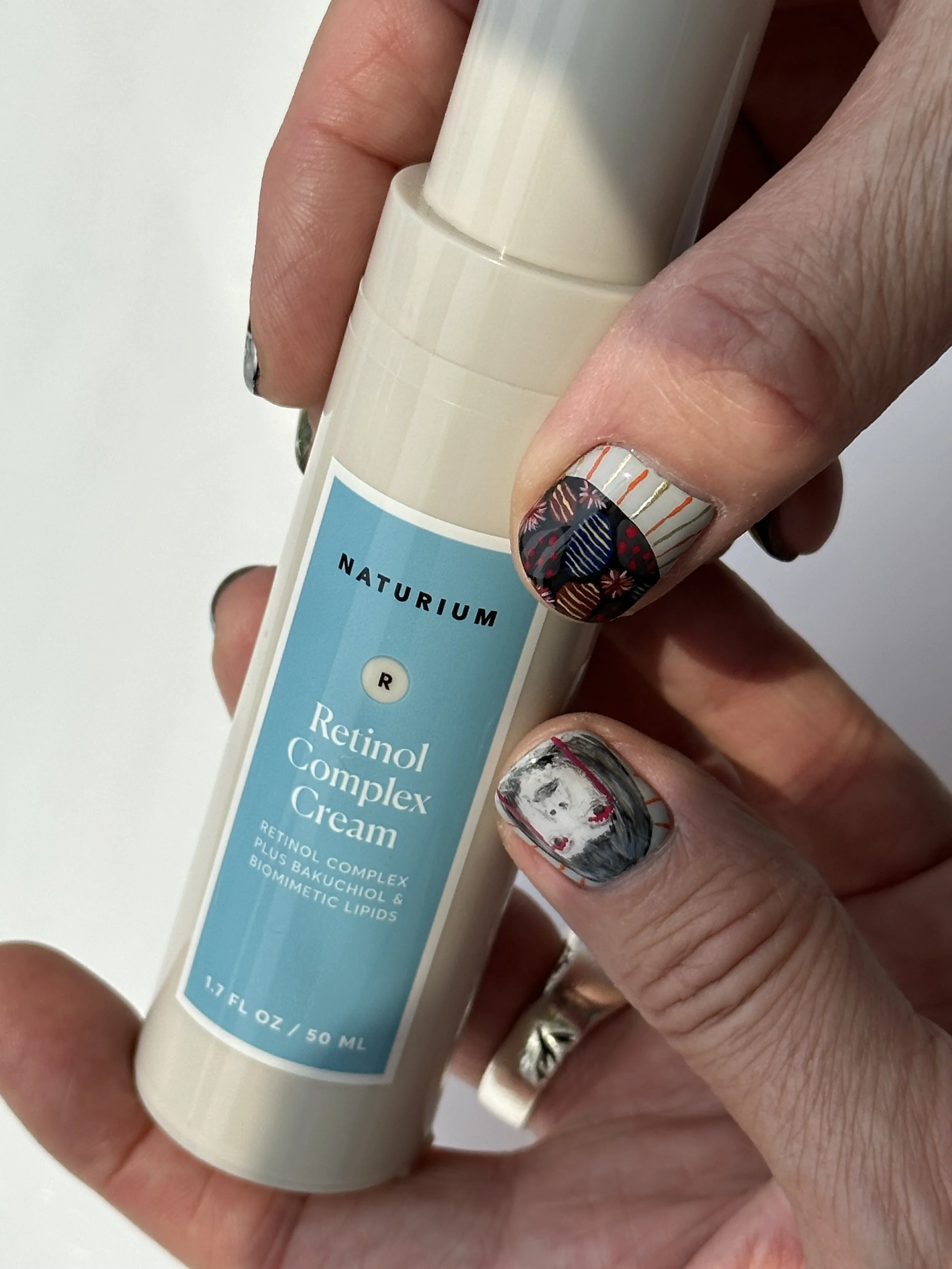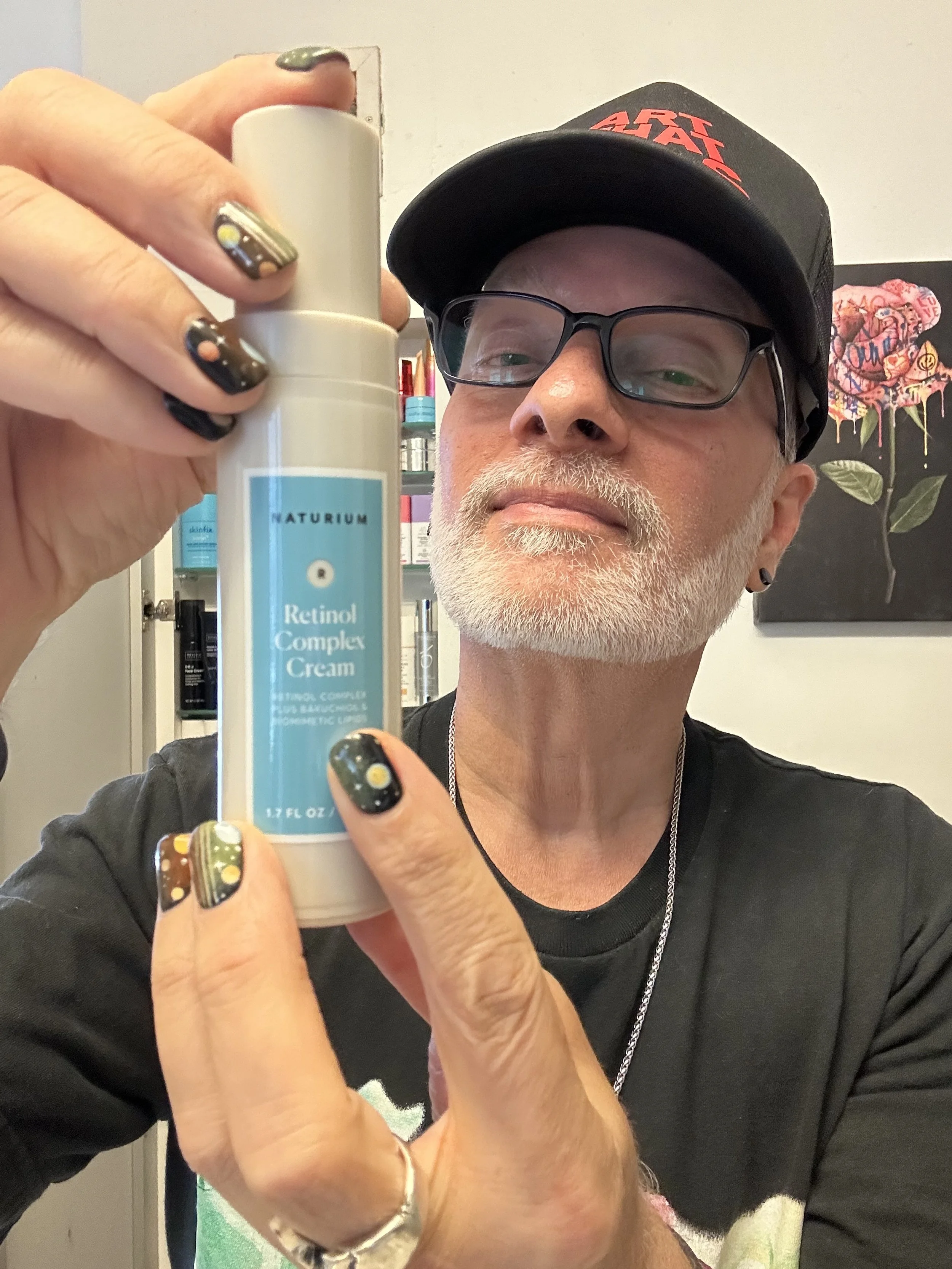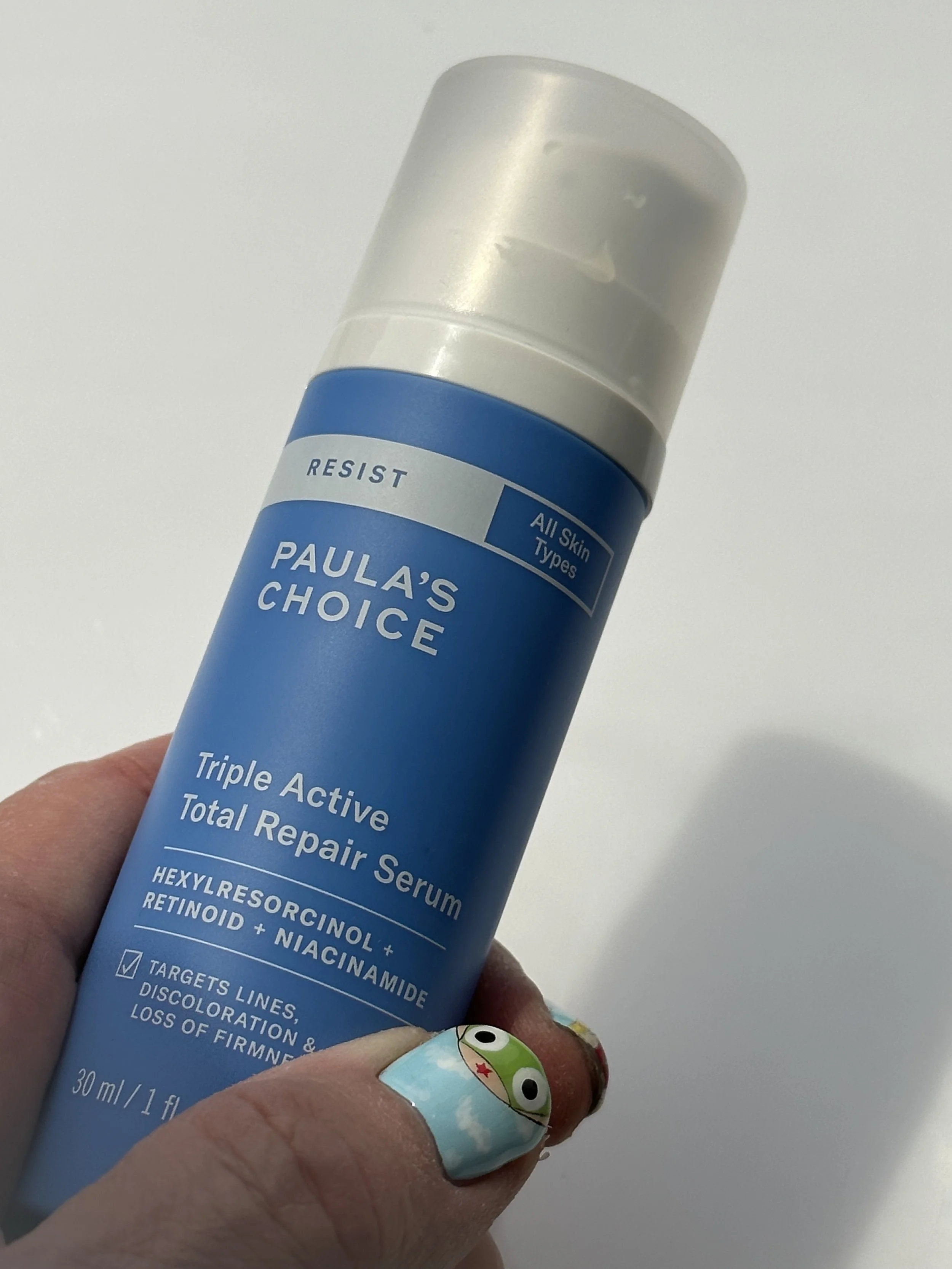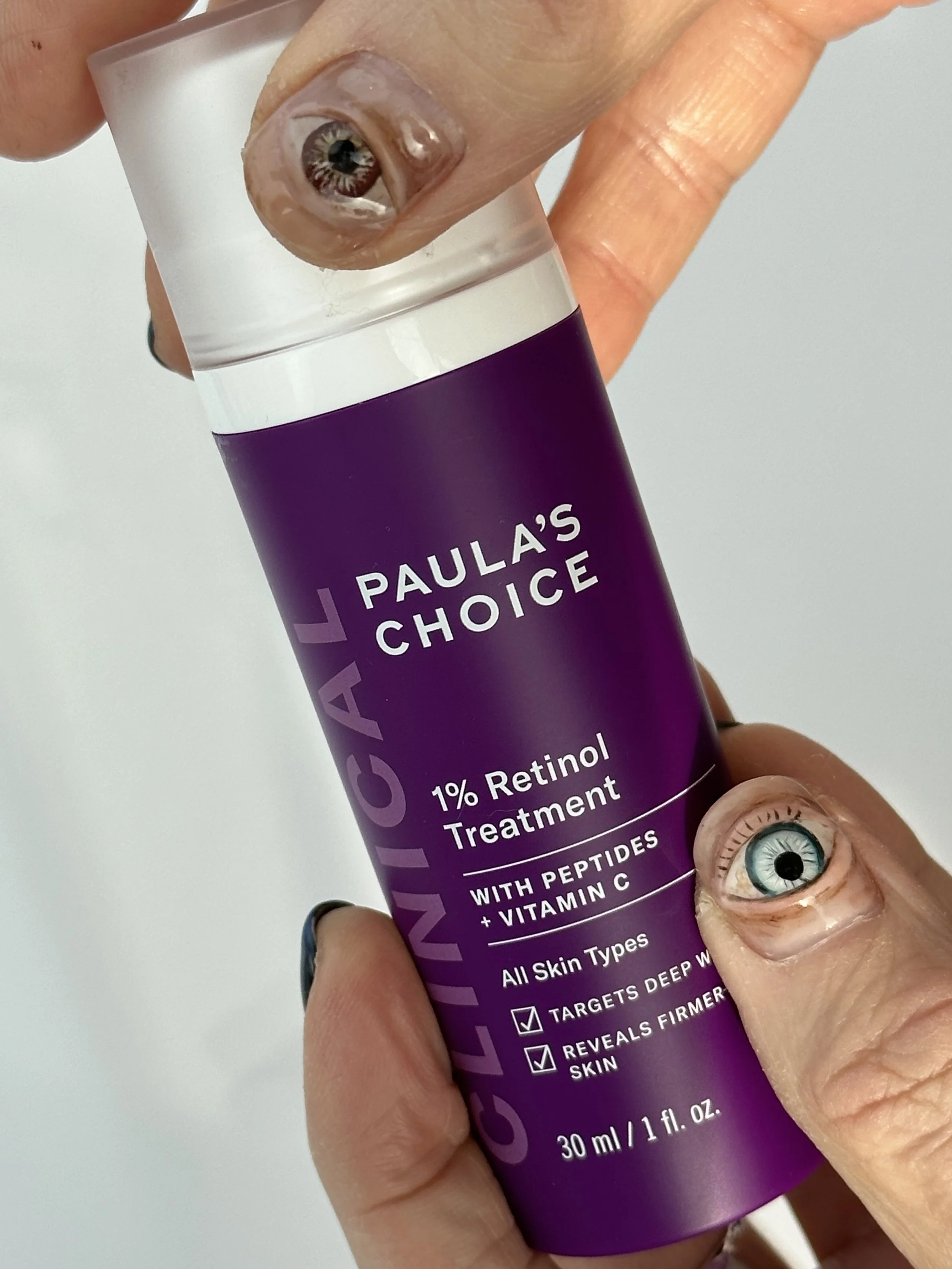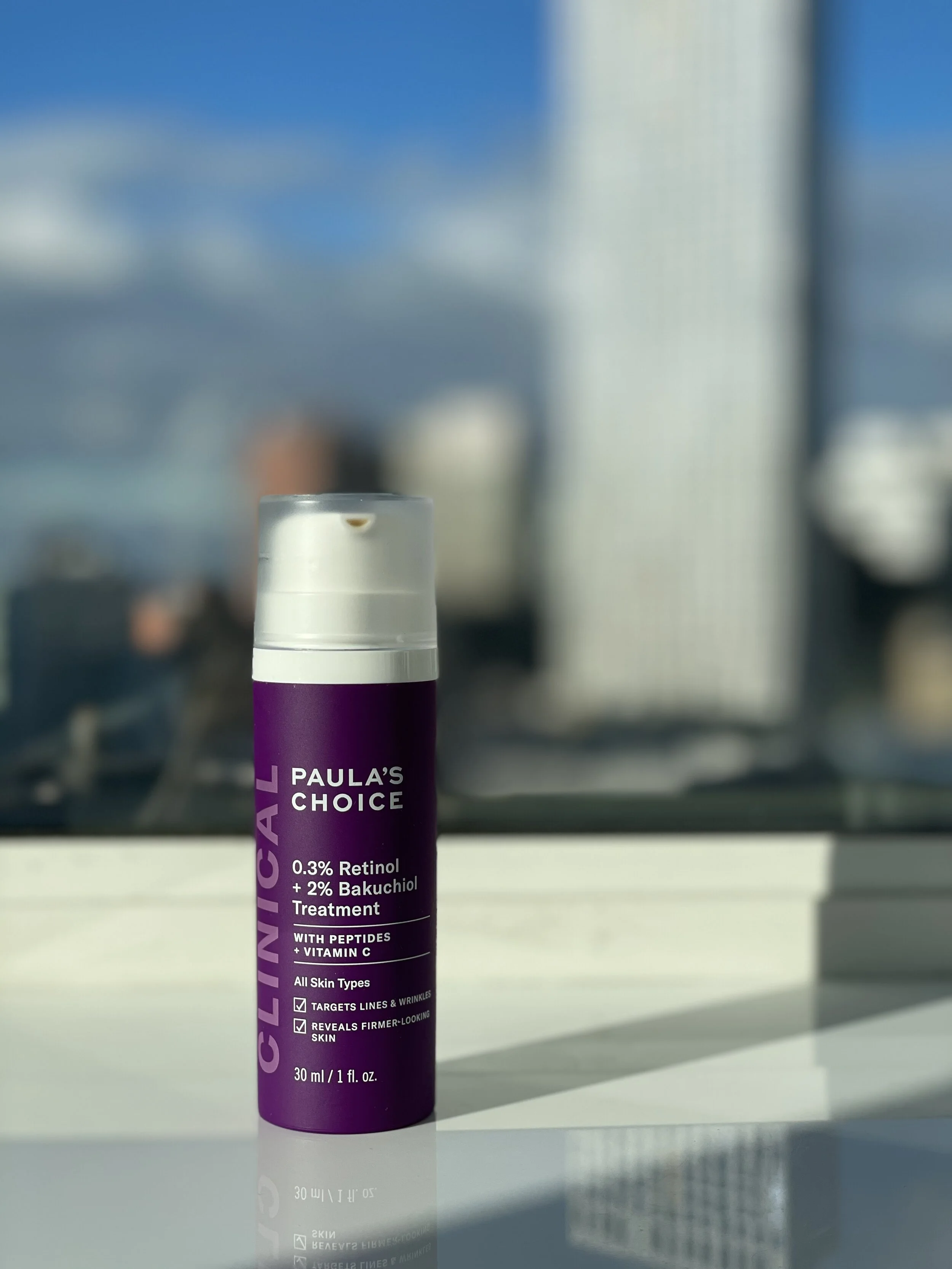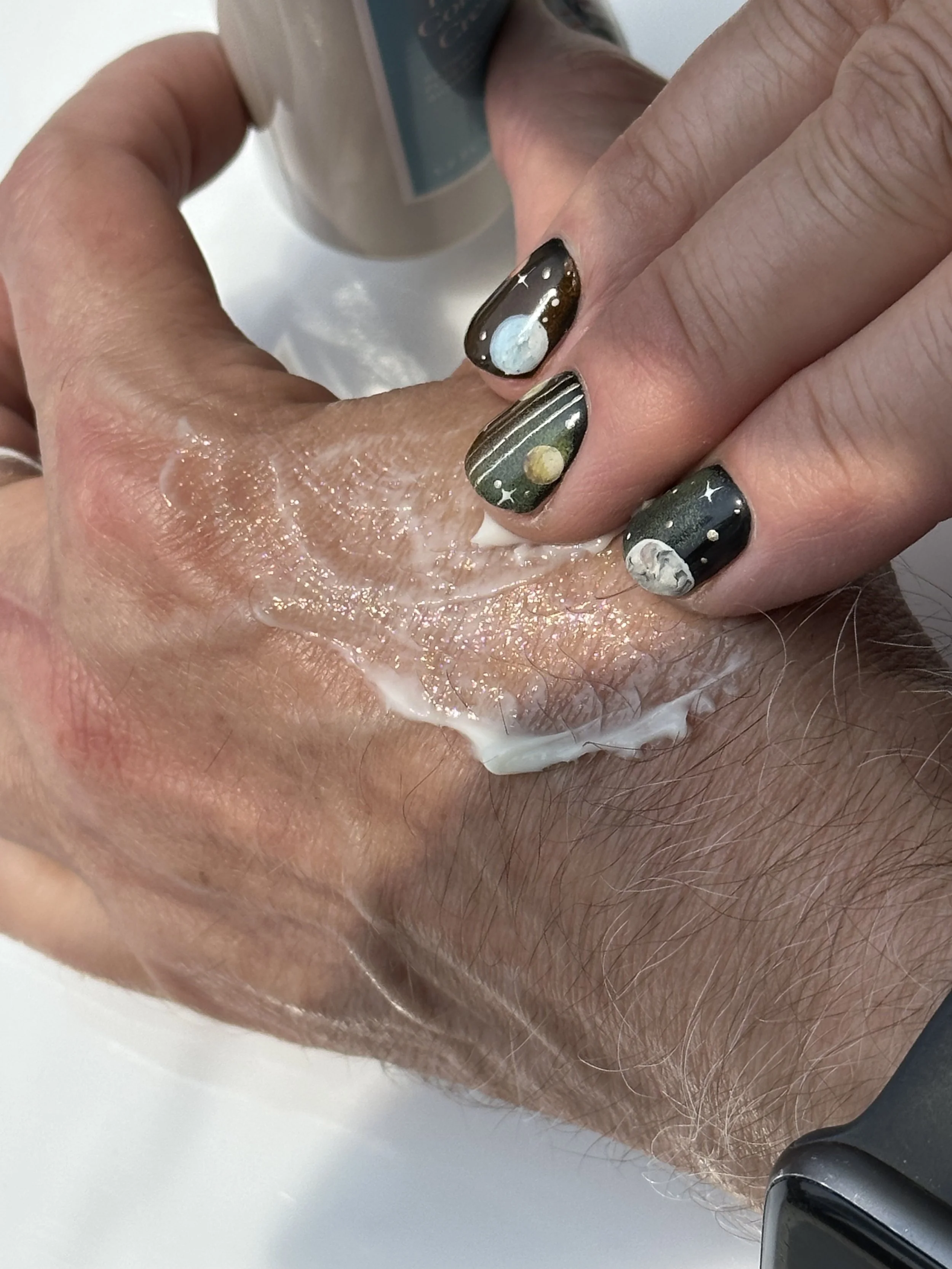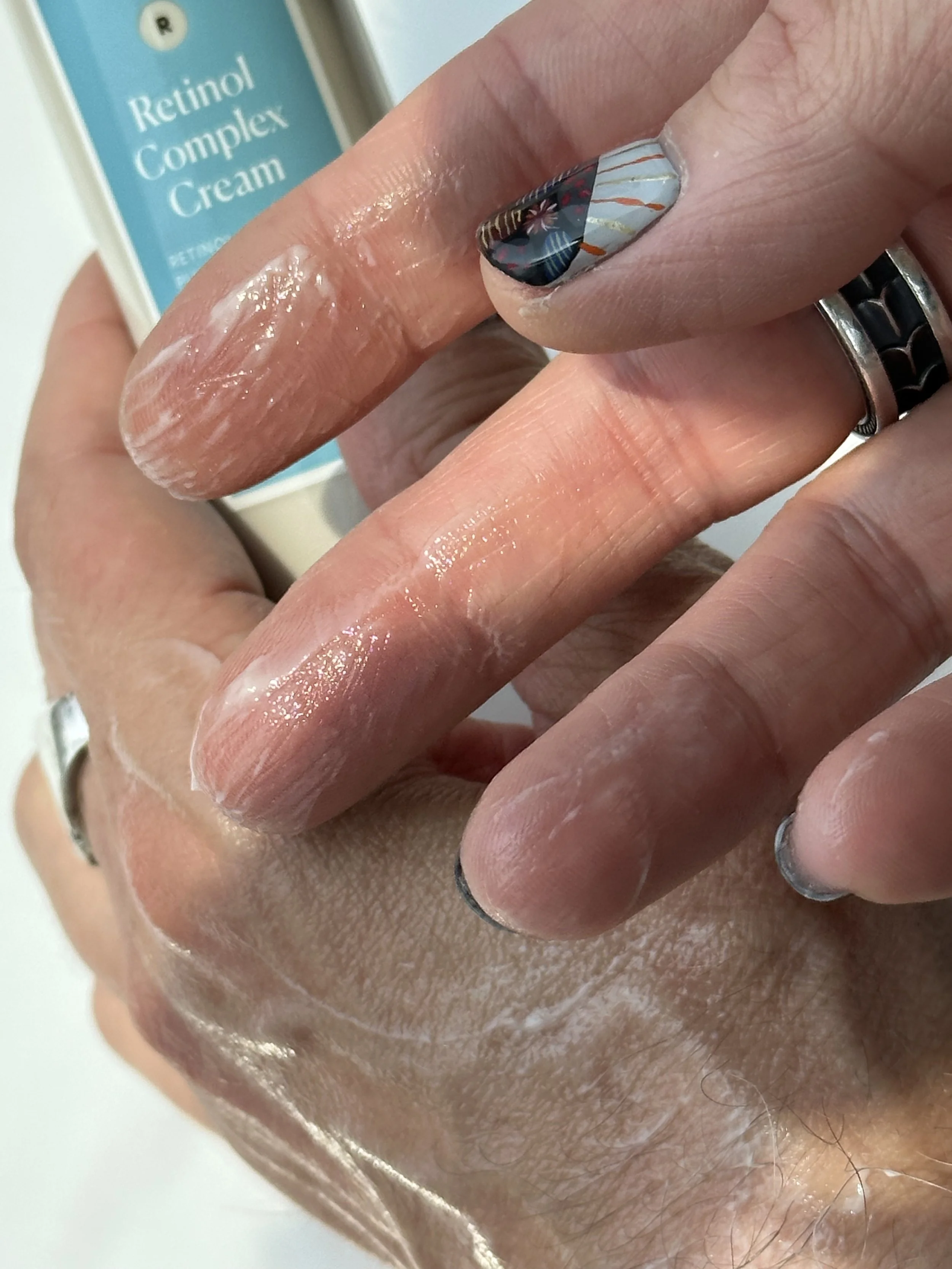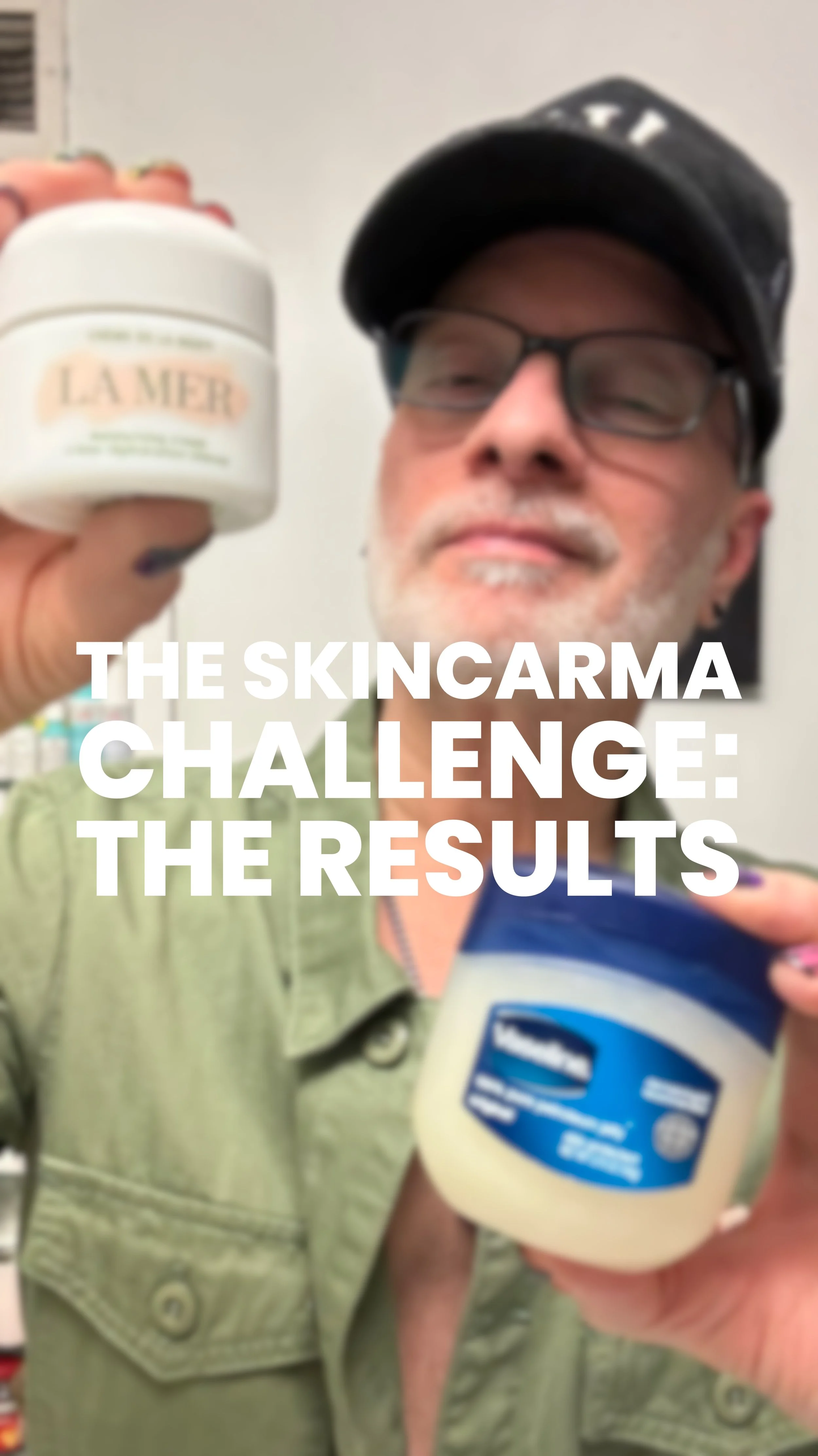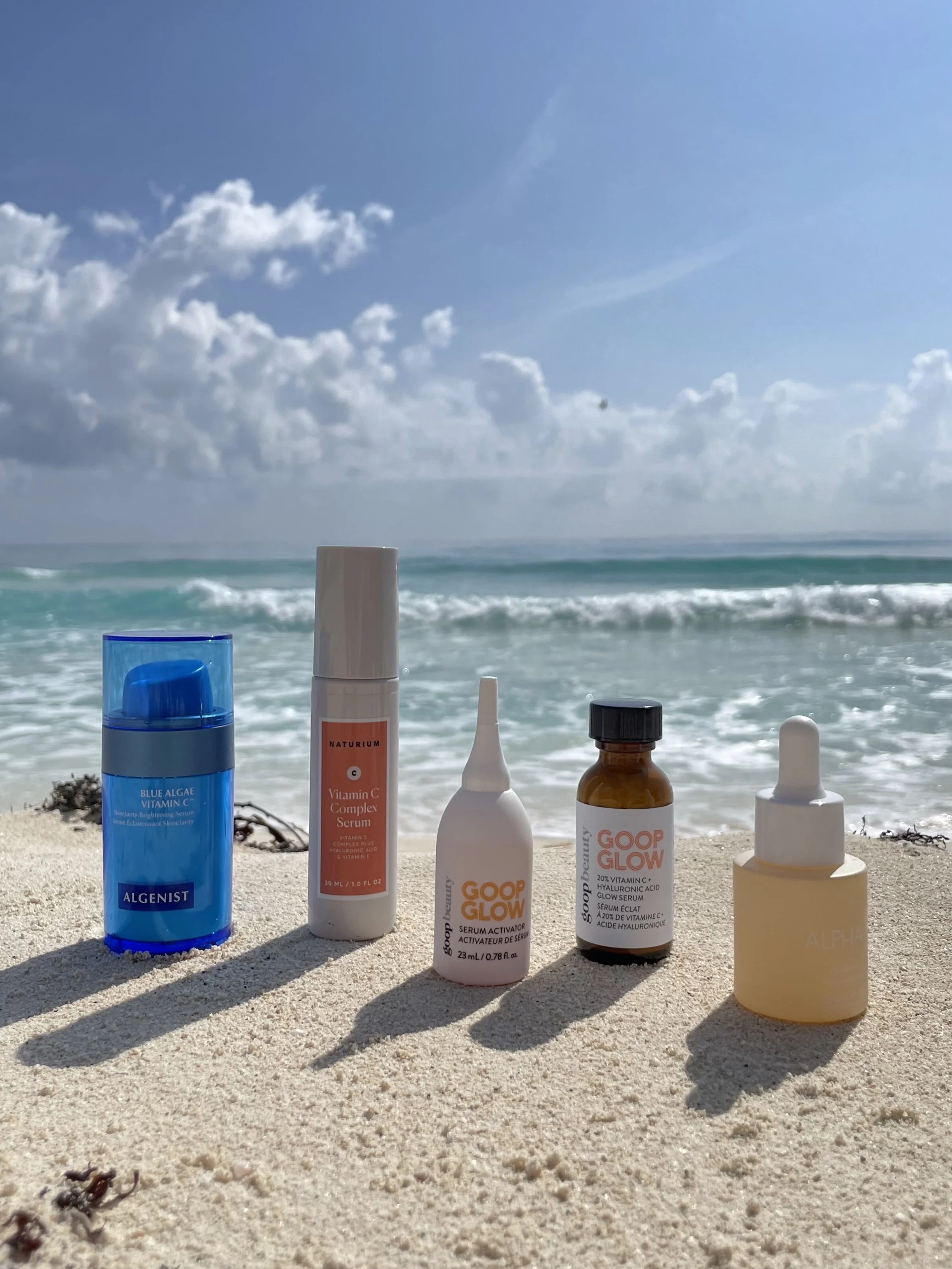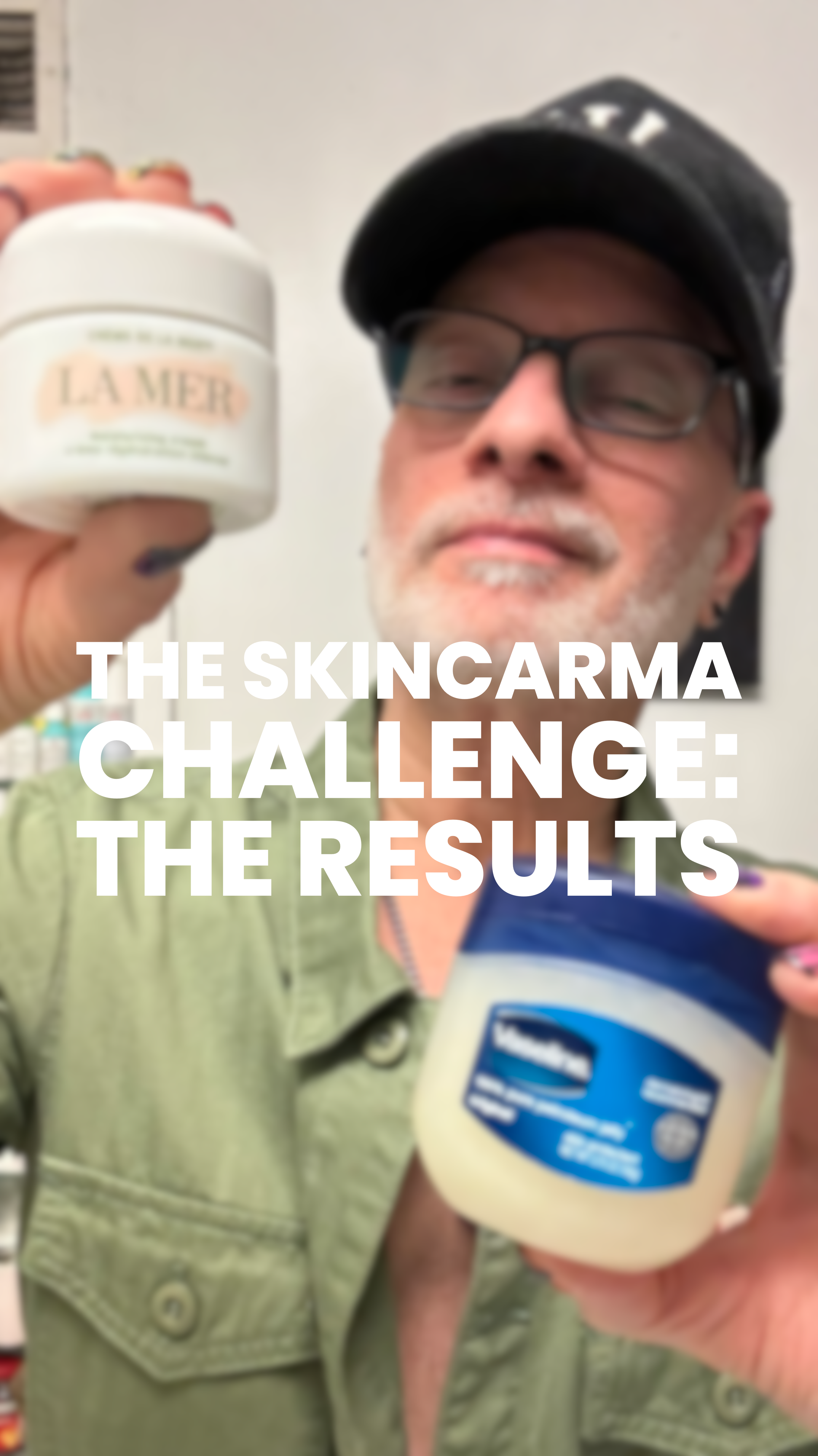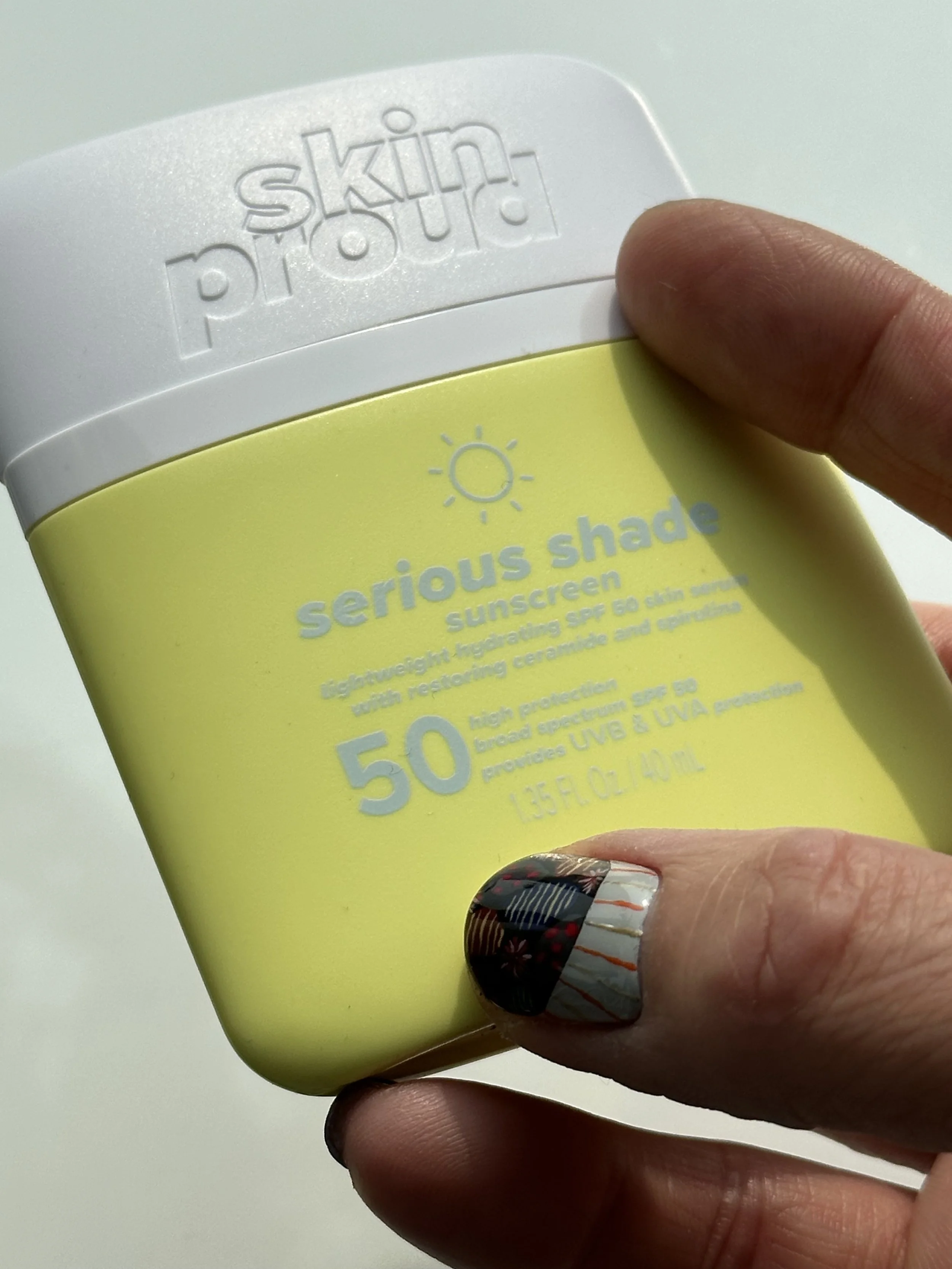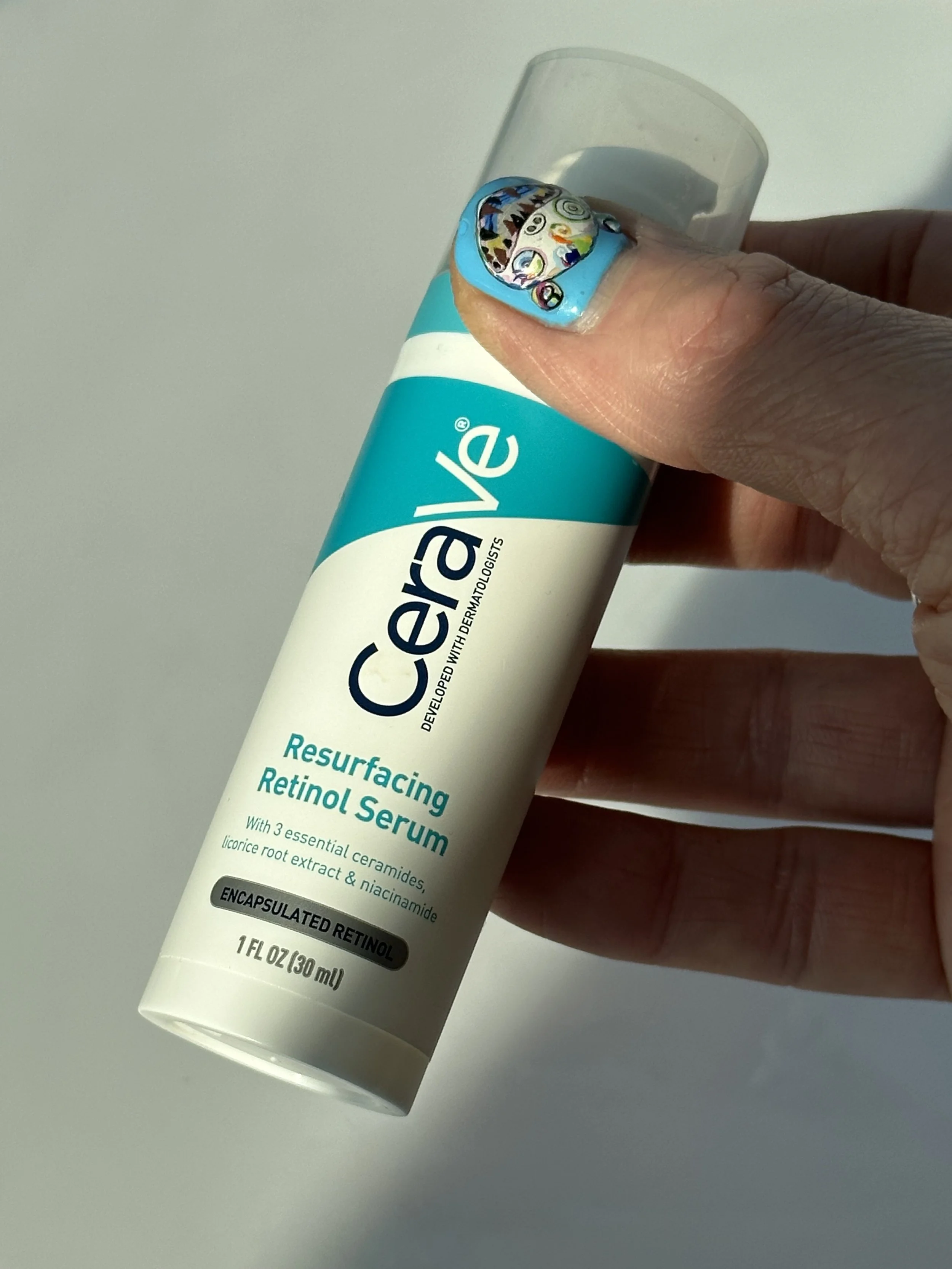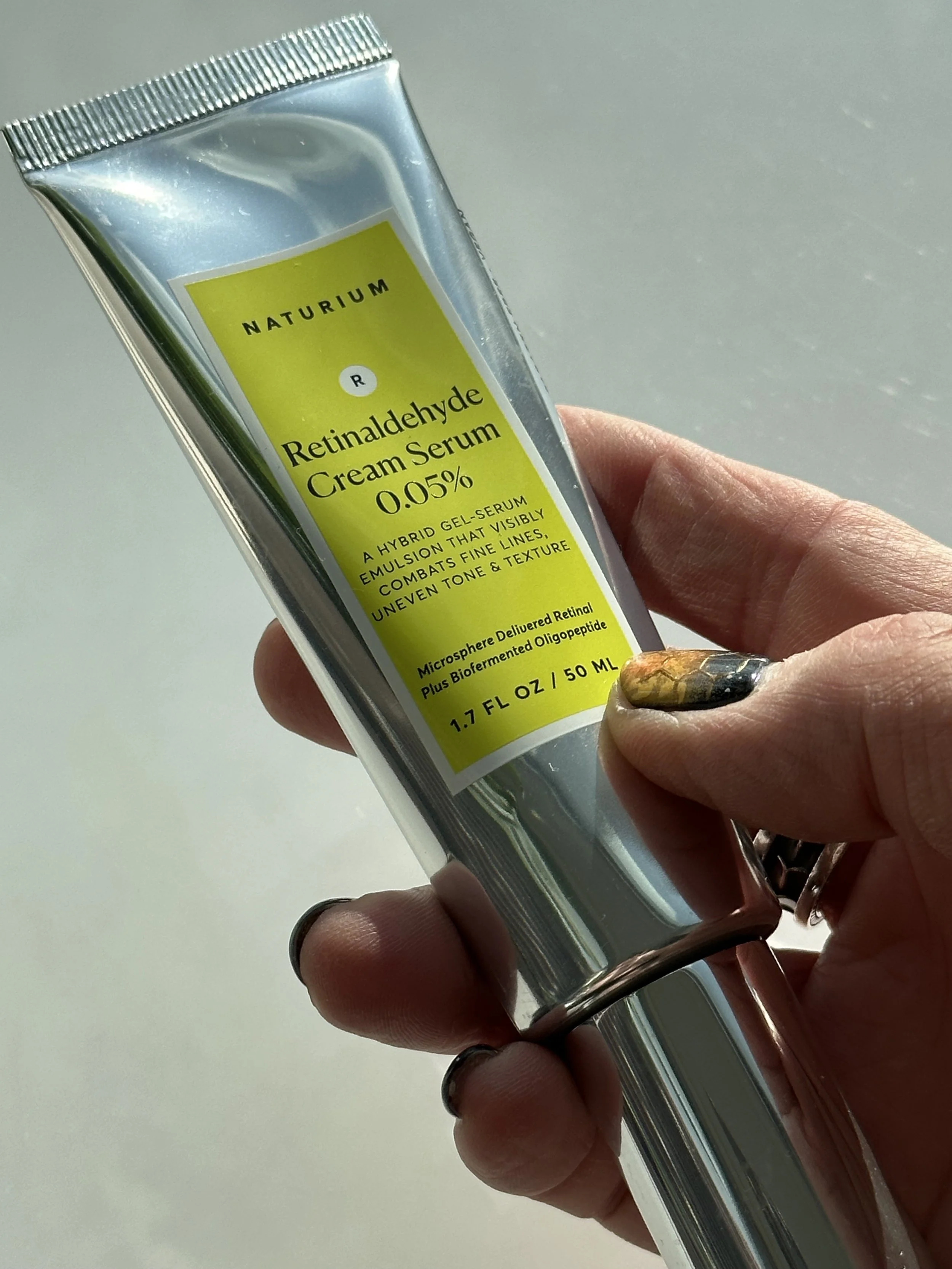PRODUCT REVIEW: NATURIUM RETINOL COMPLEX CREAM - What does Retinol do and how does it work? Can everyone use Retinol, or are there some skin types that should avoid it?
NATURIUM RETINOL COMPLEX CREAM
It took me a few years to find my balance with Retinol. Today, I use a Retinol face cream or face serum with Retinol nightly. And, I even have a favorite Retinol serum for day – the Paula’s Choice Triple Active Total Repair Serum.
I know I’m not alone when I say my Retinol journey has been uneven and more than a bit challenging. But I’m living proof that once you get past the hurdles, it’s all good.
There are a select few ingredients that I believe are not only the best anti-aging ingredients, but the only true ones – and Retinol is right at the top. Of course, the most important and effective anti-aging cream is a facial sunscreen. If you’re not protecting your skin from photoaging (and skin cancer!) caused by unprotected sun exposure, don’t even bother with a Retinol treatment – or any corrective anti-aging skincare.
Which reminds me of an experience I had in a Sephora store on Union Square in NYC several years ago. I was immersed in a product’s packaging copy when I overheard a conversation between a Sephora “cast member” and her customer. He was asking for help finding the right Retinol cream of the 987 of them on the shelves. She recommended a particular Retinol night cream then asked if he had a sunscreen for the following morning. He proudly declared, “Oh I’m good. I don’t use sunscreen.”
Horrified by his bravado, I reflexively pulled my AirPod out of my left ear and said, “Bro, if you’re not going to use sunscreen, don’t waste your money on that Retinol cream. It can’t possibly fix the new sun damage you’re getting every day. Spend the money on something else.” I left him stunned and went on my way.
I never forgot that moment. And I never forget to remind my friends, family and colleagues that they need to wear a damn sunscreen. Whether or not they’re using Retinol.
In the years since, I’ve come across many Retinol creams and serums I love (and several I don’t!). One of my new favorites is the Naturium Retinol Complex Cream – best for those with some experience with Retinol or with a mild sensitivity or aversion to stronger retinoids. More on this Retinol cream just below.
BEST RETINOL FACE CREAMS & SERUMS
As I alluded to at the outset, I’ve had kind of a wild ride with Retinol – and retinoids in general. Which begs the question about what retinoids are and how they’re different from Retinol itself.
What’s the difference between Retinol and retinoids?
Retinol and retinoids are often used interchangeably, but they are not one and the same. In fact, I often use the term “retinol” to refer to retinoids in general. My bad! The key difference lies in their chemical structure and potency. Retinol is a milder form of vitamin A, typically found in over-the-counter skincare products – most often anti-aging creams with Retinol.
Retinol needs to undergo two enzymatic conversions within the skin before it transforms into its active form, retinoic acid. On the other hand, retinoids are prescription-strength derivatives of vitamin A that already contain active retinoic acid – no conversion necessary. Retinoids bypass the conversion process entirely and are thus more potent and efficient in delivering anti-aging and skin-renewing benefits.
While Retinol can be suitable for everyday users or those with sensitive skin, more powerful retinoids like Tretinoin are favored by dermatologists for tackling more severe skin concerns, including acne and deep wrinkles.
PRODUCT REVIEW: PAULA'S CHOICE TRIPLE ACTIVE TOTAL REPAIR SERUM
I use some form of Retinol face cream or serum every day – but it wasn’t always like that. And I blame Paula Begoun, my muse and founder of her eponymous skincare brand, Paula’s Choice.
The first Retinol cream I ever used was the iconic, best-selling Paula’s Choice CLINICAL 1% Retinol Treatment. I nearly burned my face off. While prescription-strength retinoids like Tretinoin are generally more powerful, there are plenty of OTC Retinol creams that deliver pretty much the same level of anti-aging benefits – with the same level of risk.
And the Paula’s Choice CLINICAL 1% Retinol Treatment isn’t for the faint of heart. With a one-percent concentration of Retinol, it’s among the most powerful and best anti-aging treatments with Retinol on the market.
I was just beginning my experience with Paula’s Choice and the 1% Retinol Treatment was among the first products from her brand that I tried. I had no idea what I was doing and slathered it on one night like I would a face cream for dry skin in winter!
PRODUCT REVIEW: PAULA'S CHOICE CLINICAL 1% RETINOL TREATMENT
I woke up the next morning with very red, sensitized skin and decided Retinol must not be for me. It took me several days to recover and several years before I would even think about using a Retinol cream again.
Funny that today the Paula’s Choice CLINICAL 1% Retinol Treatment is one of my go-to anti-aging Retinol creams and often recommend it to experienced Retinol users who want to up their game. You can catch my Paula’s Choice CLINICAL 1% Retinol Treatment review on the blog here.
So while I use Retinol nightly, I don’t always use a strong 1% Retinol cream. I like to switch it up by alternating between products of varying strengths. Usually, I’ll use a lower-strength Retinol face cream for beginners formulated with 0.25% or 0.3% Retinol. These are often amplified with Bakuchiol, commonly marketed as a “retinol alternative.”
And the Paula’s Choice 0.3% Retinol + 2% Bakuchiol Treatment is one of my all-time favorite beginner Retinol creams. (You can catch my Paula’s Choice 0.3% Retinol + 2% Bakuchiol Treatment product review on the blog here.)
PRODUCT REVIEW: PAULA’S CHOICE 0.3% RETINOL + 2% BAKUCHIOL TREATMENT
Skincare marketers discovered Bakuchiol and its retinoid-like properties several years ago. Doing what they do best – ride and drive skincare trends – there were suddenly hundreds of anti-aging creams with Bakuchiol on the market. Marketers spun these products as delivering the same benefits of a Retinol cream with none of the sensitizing side-effects – or the clinical proof to support their assertions.
Is Bakuchiol the same as Retinol?
No. Bakuchiol and Retinol, while they both fall under the category of ant-aging ingredients, are not the same. Bakuchiol, derived from the Psoralea corylifolia plant, has gained significant attention in recent years due to its Retinol-like benefits. It is often hailed as a natural alternative to Retinol, as it offers similar anti-aging benefits without the potential side effects associated with Retinol, such as dryness and irritation.
Bakuchiol is believed to stimulate collagen production, improve skin texture, and reduce the appearance of fine lines and wrinkles. However, it is important to note that while Bakuchiol does offer anti-aging benefits similar to Retinol and other more powerful retinoids, the results are not equivalent. If you have a sensitivity to Retinol, Bakuchiol is a great alternative but it isn’t a substitute.
I’M OBSESSED WITH THIS RETINOL DAY CREAM
Before I get into my full review of the Naturium Retinol Complex Cream just below, I wanted to answer some of the most frequently asked questions about how Retinol works and how best to use a Retinol face cream for wrinkles and other signs of aging.
1. What does Retinol do and how does it work?
Retinol is a form of vitamin A that is commonly used in skincare products due to its potential benefits for improving the appearance of fine lines, wrinkles, and rough or uneven skin texture.
According to an article from the American Academy of Dermatology, Retinol works by penetrating the skin and interacting with skin cells to increase cell turnover, stimulate collagen production, and improve skin texture and tone. When used as recommended, this can result in smoother, more youthful-looking skin over time.
Sources: National Institutes of Health: Vitamin A Update: Forms, Sources, Kinetics, Detection, Function, Deficiency, Therapeutic Use and Toxicity; AAD: Retinoid or Retinol?
2. How often should I use Retinol to see results?
The frequency of Retinol use before seeing desired results varies depending on the individual’s skin and the concentration of a particular retinoid in the product being used. Another important consideration is the desired effect – the benefits you want to see.
A general guideline is to start with a lower concentration of 0.3% or below and gradually increase the frequency and concentration over time to build your skin’s tolerance for Retinol and minimize irritation along the way.
According to Dr. Sejal Shah, a board-certified dermatologist in practice at Smarter Skin Dermatology in Manhattan, it is recommended to start using Retinol once or twice a week initially, and gradually increase to nightly use as tolerated, over a period of several weeks to months.
It is also important to note that your skin’s tolerance to Retinol regresses if you stop using it or decrease usage. So consistency is key to maximizing Retinol’s benefits for your skin. And, it is imperative that you use a sunscreen every morning as Retinol can increase skin’s sensitivity to sun exposure and accelerate photoaging in unprotected skin.
Sources: [1] National Institutes of Health - “Vitamin A and Carotenoids - Health Professional Fact Sheet”; Healthline - “How Often Should You Use Retinol for Best Results?”
3. Can everyone use Retinol?
Based on research, there is no straightforward answer to whether everyone can use Retinol. However, Retinol at higher concentrations of 0.5% and 1% can easily cause irritation and side effects, including redness and sun sensitivity. Thus, it may not be suitable for everyone, especially those with sensitive or reactive skin.
According to an article from the online health resource Healthline, Retinol use may be contraindicated for pregnant or breastfeeding women, people with eczema or rosacea, and those taking certain medications that increase photosensitivity.
If you are pregnant, breast-feeding or have a sensitivity to Retinol, you may want to consider a Bakuchiol face cream or face serum with Bakuchiol, often referred to as the “retinol alternative”. While Bakuchiol is not a direct substitute for Retinol, and does not duplicate Retinol’s strongest anti-aging benefits, it does deliver benefits similar to Retinol, including smoothing of surface lines. Bakuchiol is believed to have antioxidant properties and to help renew collagen, improve skin tone and texture, and reduce the appearance of wrinkles and fine lines.
Sources: PubMed Central on the National Institutes of Health - “Why Topical Retinoids Are Mainstay of Therapy for Acne”; Mayo Clinic - “Vitamin A”; American Academy of Dermatology - “Acne: Diagnosis and treatment”
4. What's the best percentage of Retinol?
There really is no “best percentage of Retinol”. This varies from individual to individual and is reliant upon their specific skin concerns and their skin’s tolerance to Retinol.
However, according to a study published in the journal Dermatologic Surgery, a low concentration of 0.025% Retinol may provide similar anti-aging effects to a higher concentration of 0.1% Retinol, while minimizing the risk of irritation.
If you are just starting out with Retinol, or other form of retinoid, it is best to begin with a low concentration and gradually build up your skin’s tolerance for the anti-aging active. One of the best Retinol creams for beginners is the Paula’s Choice 0.3% Retinol + 2% Bakuchiol Treatment – which combines a mid-strength Retinol with Bakuchiol, buffers and hydrators that help to ameliorate potential irritation. And, the Naturium Retinol Complex Cream, which I review below, is even more gentle on skin.
One of the best Retinol face creams for advanced Retinol users is the Paula’s Choice CLINICAL 1% Retinol Treatment which I’ve reviewed on the blog here.
Sources: [1] National Institutes of Health - “Vitamin A and Carotenoids - Health Professional Fact Sheet”; National Institutes of Health PubMed Central - “Retinoids in the treatment of skin aging: an overview of clinical efficacy and safety”; Harper’s Bazaar - “What Percentage of Retinol Do You Need in Skincare Products?”
5. Product Review
Naturium Retinol Complex Cream Review
I’m a huge fan of the Naturium brand and their super affordable, well-formulated skincare products.
One of my daily go-to’s is the Naturium Vitamin C Complex Serum – one of most easily layered and best Vitamin C serums. At just $20, the anti-aging serum contains two forms of Vitamin C, Ascorbic Acid and Sodium Ascorbyl Phosphate – the best Vitamin C for acne prone skin.
By my estimation, the pair combine for a 10% concentration of antioxidant Vitamin C. It has a slightly pulpy, watery texture that I appreciate because it makes it super easy to layer into the serum step of your skincare routine.
I’m so addicted to the Vitamin C Complex Serum that I get serious #fomo when I’m about to run out. I always make sure I have one in back-stock just in case. I know I’m not alone because my Naturium Vitamin C Complex Serum review is consistently one of my most popular blog articles. Don’t miss out! Catch my review of it here.
But I’ve only just recently discovered the Naturium Retinol Complex Cream and I find it just as pleasurable, not something I often find myself saying about a Retinol cream. Its light, creamy texture is divine!
I’ve been using Naturium’s Retinol Complex Cream off and on over the course of the past two months and have really enjoyed it. I’ve used it on consecutive nights for a week at a time, but most often alternate between it and a stronger Retinol cream like the Paula’s Choice CLINICAL 1% Retinol Treatment or the Revision Skincare Retinol Complete 1.0.
I haven’t experienced any sensitivity or other signs of irritation. As an experienced Retinol user, I wouldn’t expect to see much irritation unless the formula were truly awful. How do you know if Retinol is bad? Well, as with any skincare, a Retinol cream should never contain fragrance or drying denatured alcohol. Ever!
And, one of the worst Retinol serums I’ve ever tried is the La Roche-Posay Retinol B3 Pure Retinol Serum. In addition to its mid-strength concentration of Retinol is an even higher concentration (more than double!) of denatured alcohol. As if that weren’t sensitizing enough, it also lists Parfum/Fragrance in its INCI.
CATCH IT IN ACTION ON
MY TIKTOK!
What’s the percentage of Retinol in the Naturium Retinol Complex Cream?
The Naturium Retinol Complex Cream contains a blend of Retinol and Bakuchiol with an approximate concentration of between 2.5% and 3% combined.
What’s the concentration of Retinol in the Naturium Retinol Complex Cream? TBH, I’m not 100% clear. It takes quite a bit of effort to gauge the Retinol potency of Naturium’s popular anti-aging face cream. The brand doesn’t quote the exact concentration of Retinol, though they do state that the combination of Retinol and Bakuchiol amounts to 2.5%. Hence the phrase “Retinol Complex” in the product name.
Since 2% is the commonly recommended level of Bakuchiol by the active’s manufacturer, I can easily surmise that the Naturium Retinol Complex Cream contains about a 0.5% concentration of Retinol.
That said, the online skincare product analyzer What’s in My Jar (WIMJ) estimates that the Naturium Retinol Complex Cream contains between 1.6% - 1.9% Retinol and 0.95% - 1.2% Bakuchiol. If true, that would classify Naturium’s Retinol cream as a higher strength treatment and I just don’t believe it is.
I have extensive experience with Retinol products and I can attest to the fact that Retinol creams with a 1% Retinol concentration or more are always a deep yellow. And they have a particular scent. No doubt I’ll recognize the smell of Retinol on my death bed! So let’s just accept that the Naturium Retinol Complex Cream is a mid-strength treatment – ideal for existing or advanced users and not those just starting out.
What else do I appreciate about the Naturium Retinol Complex Cream? Well, I’m certainly a fan of its $20 price tag, making it one of the most affordable Retinol creams on the market today.
In addition to Retinol and Bakuchiol, it’s also infused with a high concentration of soothing, moisturizing and antioxidant Shea Butter at ingredient number three just after humectant Glycerin.
Because of its solid blend of humectants and emollients, Naturium’s Retinol Complex Cream may very well be the only face cream you’ll need. Over the last several weeks, I’ve used it as an anti-aging moisturizer with Retinol – as the last step in my PM skincare routine.
If you’re a fan of Retinol and a regular or experienced user, this one is for you. If you’re just starting out, I recommend the Paula’s Choice 0.3% Retinol + 2% Bakuchiol Treatment or other lower-strength option. Catch reviews of my top picks of the best Retinol face creams and serums on the blog here.
6. Pros & Cons
What I like about it: The Naturium Retinol Complex Cream is one of the best mid-strength Retinol face creams. I love its blend of Retinol and Bakuchiol along with its high concentrations of moisturizing emollients and water-binding humectants. And for $20, you can’t get anything better for the price.
What I don’t like about it: The mystery over its actual Retinol concentration is perplexing, especially since Naturium loves to quote the levels of key actives in their formulas. Hmm…
Who it’s for: All skin types (except Retinol beginners and those sensitive to Retinol).
SHOP THE BLOG: Want to try it for yourself? Purchase the Naturium Retinol Complex Cream for $20 here.
The Ingredient List of the Naturium Retinol Complex Cream:
 sii|h 0 0, Butyrospermum Parkii (Shea) Butter
sii|h 0 0, Butyrospermum Parkii (Shea) Butter  emo|vc, Dimethicone emo 0 1, Caprylic/Capric Triglyceride emo, Astrocaryum Murumuru Seed Butter emo, Retinol
emo|vc, Dimethicone emo 0 1, Caprylic/Capric Triglyceride emo, Astrocaryum Murumuru Seed Butter emo, Retinol  cci, Squalane
cci, Squalane  sii|emo 0 1, Gossypium Herbaceum (Cotton) Seed Oil 2 3, Bakuchiol
sii|emo 0 1, Gossypium Herbaceum (Cotton) Seed Oil 2 3, Bakuchiol  cci|aox|amic, Ethylhexyl Olivate, Phytosteryl/Octyldodecyl Lauroyl Glutamate
cci|aox|amic, Ethylhexyl Olivate, Phytosteryl/Octyldodecyl Lauroyl Glutamate  emo, Sodium Acrylates Copolymer vc, Hydroxyacetophenone aox, Polyacrylate Crosspolymer-6 vc, Bidens Pilosa Extract h, Humulus Lupulus (Hops) Cone Extract amic, Sodium Hyaluronate
emo, Sodium Acrylates Copolymer vc, Hydroxyacetophenone aox, Polyacrylate Crosspolymer-6 vc, Bidens Pilosa Extract h, Humulus Lupulus (Hops) Cone Extract amic, Sodium Hyaluronate  sii|h 0 0, Lecithin
sii|h 0 0, Lecithin  emo|emu, Glyceryl Polyacrylate, Linum Usitatissimum (Linseed) Seed Oil
emo|emu, Glyceryl Polyacrylate, Linum Usitatissimum (Linseed) Seed Oil  emo|perf, Glyceryl Behenate emo|emu, Linoleic Acid
emo|perf, Glyceryl Behenate emo|emu, Linoleic Acid  sii|emo|surf, Potassium Sorbate pres, Phytosteryl Canola Glycerides, Caprylyl Glycol h|emo, Phenoxyethanol pres, Copernicia Cerifera (Carnauba) Wax emo 0 1, Hexylene Glycol solv|emu|perf|surf 0-1 0-2, Oleic Acid emo|emu, Palmitic Acid sii|emo|emu 0 2, Helianthus Annuus (Sunflower) Seed Oil
sii|emo|surf, Potassium Sorbate pres, Phytosteryl Canola Glycerides, Caprylyl Glycol h|emo, Phenoxyethanol pres, Copernicia Cerifera (Carnauba) Wax emo 0 1, Hexylene Glycol solv|emu|perf|surf 0-1 0-2, Oleic Acid emo|emu, Palmitic Acid sii|emo|emu 0 2, Helianthus Annuus (Sunflower) Seed Oil  emo 0 0, Polysorbate 20 emu|surf 0 0, Propanediol solv|h, Tocopherol
emo 0 0, Polysorbate 20 emu|surf 0 0, Propanediol solv|h, Tocopherol  aox 0-3 0-3, Stearic Acid emo|vc 0 2-3, Tocopheryl Acetate aox 0 0, Triolein vc, 1,2-Hexanediol solv, Disodium Cocoamphodiacetate surf, Xanthan Gum vc, Ethyl Ferulate aox
aox 0-3 0-3, Stearic Acid emo|vc 0 2-3, Tocopheryl Acetate aox 0 0, Triolein vc, 1,2-Hexanediol solv, Disodium Cocoamphodiacetate surf, Xanthan Gum vc, Ethyl Ferulate aoxIS IT REALLY A SCAM?
Find out on my TikTok channel.
MY TOP VITAMIN C PICKS FW21: NEW VITAMIN C SERUMS I’M CRUSHING ON FROM ALGENIST, NATURIUM AND MORE
WATCH MY VIDEO REVIEW
THE BEST NIACINAMIDE SERUMS FOR CLOGGED PORES AND A BRIGHTER COMPLEXION
ON MY YOUTUBE CHANNEL HERE
WATCH MY VIDEO REVIEW OF
SKINCARE HACKS: GLYCOLIC ACID IS THE NATURAL DEODORANT THAT WORKS!
ON MY YOUTUBE CHANNEL HERE
WATCH MY VIDEO REVIEW OF
MY FAVORITE HUMECTANT SERUMS FROM PAULA'S CHOICE, THE INKEY LIST, GHOST DEMOCRACY AND MORE
ON MY YOUTUBE CHANNEL HERE
WATCH MY VIDEO REVIEW
COOL CLEAN FACIAL SUNSCREENS TO KEEP US SAFE AND SMILING IN THE SUN!
ON MY YOUTUBE CHANNEL HERE
WATCH MY VIDEO REVIEW
THE OPULUS BEAUTY LABS RETINOL SYSTEM – THE COOLEST RETINOL INNOVATION I’VE EVER SEEN
ON MY YOUTUBE CHANNEL HERE
WATCH MY VIDEO REVIEW
MY 2021 VITAMIN C PICKS + THE BEST VITAMIN C SERUMS TO BRIGHTEN UP THE COMPLEXION!
ON MY YOUTUBE CHANNEL HERE
WATCH MY VIDEO REVIEW OF
MY WINTER SKIN SAVIOR: SKINFIX BARRIER+ LIPID REPLENISHING SKINCARE
ON MY YOUTUBE CHANNEL HERE
WATCH MY VIDEO REVIEW
A COMPLETE K-BEAUTY ROUTINE WITH THE BEST FACIAL SKINCARE FROM PURITO, COSRX, MISSHA & MORE!
ON MY YOUTUBE CHANNEL HERE
WATCH MY VIDEO REVIEW
THE YEAR’S BEST VITAMIN C SERUMS WITH PAULA'S CHOICE, SUNDAY RILEY, THE INKEY LIST AND MORE!
ON MY YOUTUBE CHANNEL HERE
WATCH MY VIDEO REVIEW OF
A SELFCARE SUNDAY NOT FOR THE FAINT OF HEART – WITH THE PAULA’S CHOICE 25% AHA PEEL!
ON MY YOUTUBE CHANNEL HERE


